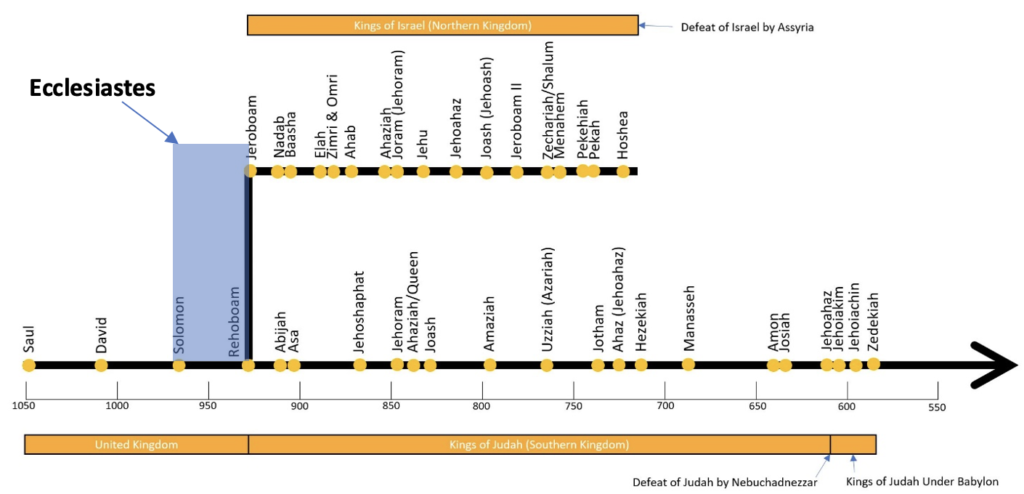Ecclesiastes
The Search for Meaning
Summary | About | Why You Should Read it | Author | When Written | Context | Timeline | Location | Outline | Observations | Resources
Summary
Ecclesiastes is a philosophical book in the Old Testament traditionally attributed to King Solomon. It explores the meaning of life and the human experience, often reflecting on the futility of earthly pursuits. The author grapples with the inevitability of death, the fleeting nature of pleasure, and the limitations of wisdom. Key themes include the cyclical nature of life, the pursuit of meaning, and the importance of enjoying simple pleasures. Ultimately, the book concludes that while life can seem meaningless, one should fear God and enjoy the gifts of life.
The following table provides a high-level look at the structure and contents of the book of Ecclesiastes.

About
Ecclesiastes is the 21st book of the Bible and fourth book of Poetry in the Old Testament.

Why You Should Read It
You will likely find Ecclesiastes valuable for several reasons:
- Realism about Life: The book confronts the realities of life, including suffering, uncertainty, and the inevitability of death, encouraging readers to engage honestly with their experiences.
- Wisdom Literature: It offers insights into the nature of wisdom and knowledge, prompting reflection on how to live a meaningful life in a complex world.
- Pursuit of Meaning: Ecclesiastes challenges readers to consider what truly matters, moving beyond superficial pursuits to find deeper significance in their relationship with God and others.
- Enjoyment of Life: The book emphasizes the importance of enjoying life’s simple pleasures, reminding Christians to appreciate God’s gifts amidst the struggles.
- Faith and Doubt: It provides a space to explore doubts and questions about faith, demonstrating that seeking understanding is a part of the spiritual journey.
Overall, Ecclesiastes encourages a balanced perspective on life, combining a recognition of its challenges with an appreciation for its joys.
Author
King Solomon was offered a gift by God and he chose Wisdom. He was the wisest man on earth and had God’s blessing. He compiled the Ecclesiastes towards the end of his years as king through all the lessons he learned, especially the hardships and failures.
When Written
Solomon likely wrote the book of Ecclesiastes during his reign as king from 970 to 930 B.C. with the majority written closer to the end of his reign.
Context
Ecclesiastes was likely written in the context of ancient Israel during a time of prosperity and relative peace. The author, traditionally identified as Solomon, reflects on the experiences and observations of a life filled with wealth, wisdom, and privilege.
Key contextual elements include:
- Philosophical Exploration: The author engages with existential questions and the search for meaning, influenced by both Hebrew traditions and possibly the philosophical currents of neighboring cultures, such as those from Greece.
- Disillusionment: The book reflects a sense of disillusionment with materialism and the transient nature of life, likely influenced by the challenges and moral dilemmas faced by the people of Israel.
- Wisdom Literature Tradition: Ecclesiastes fits within the genre of wisdom literature, which includes Proverbs and Job, focusing on practical life lessons, moral reflections, and the nature of existence.
- Cyclical Nature of Life: The recurring themes of cycles and the fleeting nature of human endeavors suggest an awareness of the historical and social conditions of the time, including the struggles of post-exilic society.
Overall, Ecclesiastes serves as a philosophical and theological reflection on life, purpose, and the human condition in a specific historical and cultural milieu.
Timeline
The timeline below shows from the first king to the start of the Exile. The Book of Proverbs was written during the reign of King Solomon.
Location
Solomon reigned and wrote Ecclesiastes from Jerusalem, in Judah, of Israel.
Outline
| I. Author (1:1) |
| II. Theme: The meaninglessness of human efforts on earth apart from God (1:2) |
| III. Introduction: The profitlessness of human toil to accumulate things in order to achieve happiness (1:3-11) |
| IV. Discourse, Part 1: In spite of life’s apparent enigmas and meaninglessness, it is to be enjoyed as a gift from God (1:12;11:6) |
| A. Since human wisdom and endeavors are meaningless, people should enjoy their life and work and its fruits as gifts from God (1:12;6:9) |
| 1. Introduction (1:12-18) |
| a. Human endeavors are meaningless (1:12-15) |
| b. Pursuing human wisdom is meaningless (1:16-18) |
| 2. Seeking pleasure is meaningless (2:1-11) |
| 3. Human wisdom is meaningless (2:12-17) |
| 4. Toiling to accumulate things is meaningless (2:18;6:9) |
| a. Because people must leave the fruits of their labor to others (2:18-26) |
| b. Because all human efforts remain under the government of God’s sovereign appointments, which people cannot fully know and which all their toil cannot change (3:1;4:3) |
| c. Because there are things better for people than the envy, greed and amibition that motivate such toil (4:4-16) |
| d. Because the fruits of human labor can be lost, resulting in frustration (5:1;6:9) |
| B. Since people cannot fully know what is best to do or what the future holds for them, they should enjoy now the life and work God has given them (6:10;11:6) |
| 1. Introduction: What is predetermined by God is inalterable, and people cannot fully know what is best or what the future holds (6:10-12) |
| 2. People cannot fully know what is best to do (chs. 7-8) |
| 3. People cannot fully know what the future holds (9:1;11:6) |
| V. Discourse, Part 2: Since old age and death will soon come, people should enjoy life in their youth, remembering that God will judge (11:7;12:7) |
| A. People should enjoy thei life on earth because their future after death is mysterious, and in that sense is meaningless for their present life (11:7-8) |
| B. People should enjoy the fleeting joys of youth, but remember that God will judge (11:9-10) |
| C. People should remember their Creator (and his gifts) in their youth, before the deteriorations of old age and the dissolution of the body come (12:1-7) |
| VI. Theme Repeated (12:8) |
| VII. Conclusion: Reverently trust in and obey God (12:9-14) |
Observations
- The key word in Ecclesiastes is “vanity.”
- Vanity is the futile emptiness of trying to be happy apart from God.
- The word “vanity” occurs some 37 times in Ecclesiastes.
- Life (“under the sun” is used 29 times) seems to be filled with:
- Inequities
- Changes in fortune
- Uncertainties
- Violations of justice
- The Book of Ecclesiastes is the record of an intense search for meaning and satisfaction in life on the earth.
- Live lived without regard for God is life lived without value.
- When life is viewed “under the sun,” it is declared to be empty. 1:9
- When life is viewed from God’s perspective (“Above the sun”), it takes on a new and special meaning. 2:24
- Vanity is the futile emptiness of trying to be happy apart from God.
Ecclesiastes 3:1-8
“To everything there is a season, A time for every purpose under heaven: A time to be born, And a time to die; A time to plant, And a time to pluck what is planted; A time to kill, And a time to heal; A time to break down, And a time to build up; A time to weep, And a time to laugh; A time to mourn, And a time to dance; A time to cast away stones, And a time to gather stones; A time to embrace, And a time to refrain from embracing; A time to gain, And a time to lose; A time to keep, And a time to throw away; A time to tear, And a time to sew; A time to keep silence, And a time to speak; A time to love, And a time to hate; A time of war, And a time of peace.
Ecclesiastes 12:1
“Remember now your Creator in the days of your youth, before the difficult days come, and the years draw near when you say, I have no pleasure in them.”
Old Testament
New Testament
Free Resources
Other Resources
- x


